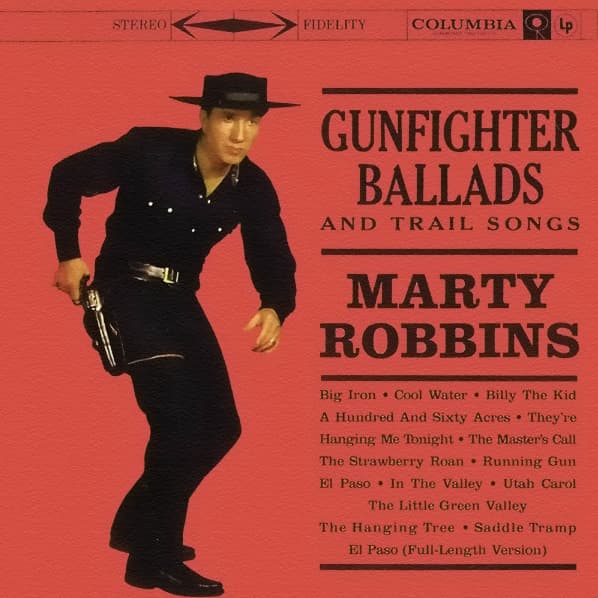
The Mirage of Hope: A Cowboy’s Desperate Quest for Life-Giving Sustenance in a Merciless Desert
Marty Robbins‘ iconic and utterly evocative rendition of “Cool Water” is a quintessential piece of his enduring legacy in Western music, a song that paints a vivid picture of the relentless struggle against the unforgiving desert. Featured prominently on his seminal 1959 concept album, “Gunfighter Ballads and Trail Songs”, this track, while not a standalone charting single, was a crucial component of an album that achieved monumental success. “Gunfighter Ballads and Trail Songs” soared to number 6 on the Billboard Top Pop Albums chart, solidifying Robbins‘ legendary status as the definitive voice of cowboy lore and frontier tales. “Cool Water” contributed significantly to the album’s rich tapestry of characters and landscapes, offering a poignant look into the desperate quest for survival and the power of hope, even in the face of despair, becoming a beloved highlight for countless aficionados of authentic Western music. It’s these meticulously crafted album tracks that truly showcase the depth of Robbins‘ artistry and his profound connection to the spirit of the American West.
The story behind “Cool Water” predates Marty Robbins‘ famous rendition, tracing its origins back to the legendary Western singing group, The Sons of the Pioneers. This song was originally written by Bob Nolan, a founding member of the group, and first recorded by them in 1941. It became one of their signature songs, celebrated for its vivid imagery and poignant narrative. Robbins, a deep admirer and student of classic Western music, chose to include his interpretation on “Gunfighter Ballads”, paying homage to the genre’s roots while imbuing it with his own distinctive vocal style. The narrative is a desperate, almost hallucinatory, plea from a cowboy and his mule, “Dan,” who are slowly succumbing to thirst in the parched desert. It captures the psychological toll of extreme hardship and the persistent, almost taunting, vision of “cool water” that keeps them moving forward, even as hope dwindles. Robbins‘ decision to include such a classic spoke volumes about his reverence for the traditions he championed.
The meaning of “Cool Water” is a powerful and visceral portrayal of the desperate struggle for survival against overwhelming natural forces, particularly the unforgiving desert. It’s a song about the torment of thirst, the relentless pursuit of a vital necessity, and the psychological toll that extreme deprivation can take, leading to vivid hallucinations and a blurring of reality and hope. The lyrics convey the agonizing physical and mental suffering of the cowboy and his mule, their bodies failing, but their minds haunted by the mirage of water. Lines like “Cool water, cool water / There’s a thirst in the soul / That only cool water can fill” express not just a physical need, but a deeper, spiritual longing for solace and relief. It speaks to the universal human experience of confronting insurmountable odds, the tenacious grip of hope even when all seems lost, and the primal drive for life-sustaining elements in a harsh, indifferent world, where survival becomes a daily, desperate prayer.
Marty Robbins‘ vocal performance on “Cool Water” is masterful in its ability to convey both the physical exhaustion and the persistent hope of the parched traveler. His voice, clear and resonant, delivers the narrative with a sense of weary determination, gradually building the intensity as the desperation mounts. He sings with an almost hypnotic quality, capturing the repetitive, almost trance-like nature of the journey through the heat. The musical arrangement, typical of the “Gunfighter Ballads” album, is sparse yet incredibly effective, featuring a prominent, often haunting, acoustic guitar that sets a desolate mood, and subtle rhythmic elements that evoke the slow, agonizing pace of the trek. This minimalist approach allows Robbins‘ voice and the powerful narrative to remain the central focus, creating an immersive and profoundly moving musical tableau that truly transports the listener to the sun-baked plains.
Listening to “Cool Water” today evokes a profound sense of nostalgia for a golden era of Western music, when songs were vivid cinematic experiences and artists like Marty Robbins were their most compelling guides. It transports us back to a time of rugged individualism and the stark realities of frontier life, reminding us of the enduring power of human resilience in the face of overwhelming odds. For those of us who grew up with Robbins‘ incredible voice and his tales of the vast American West, this song remains a cherished gem, a powerful and poignant anthem for the desperate quest for survival and the enduring, sometimes illusory, promise of “cool water.” It’s a melody that, even after all these years, continues to resonate with its parched plea, reminding us of the fragility of life and the unyielding human spirit.